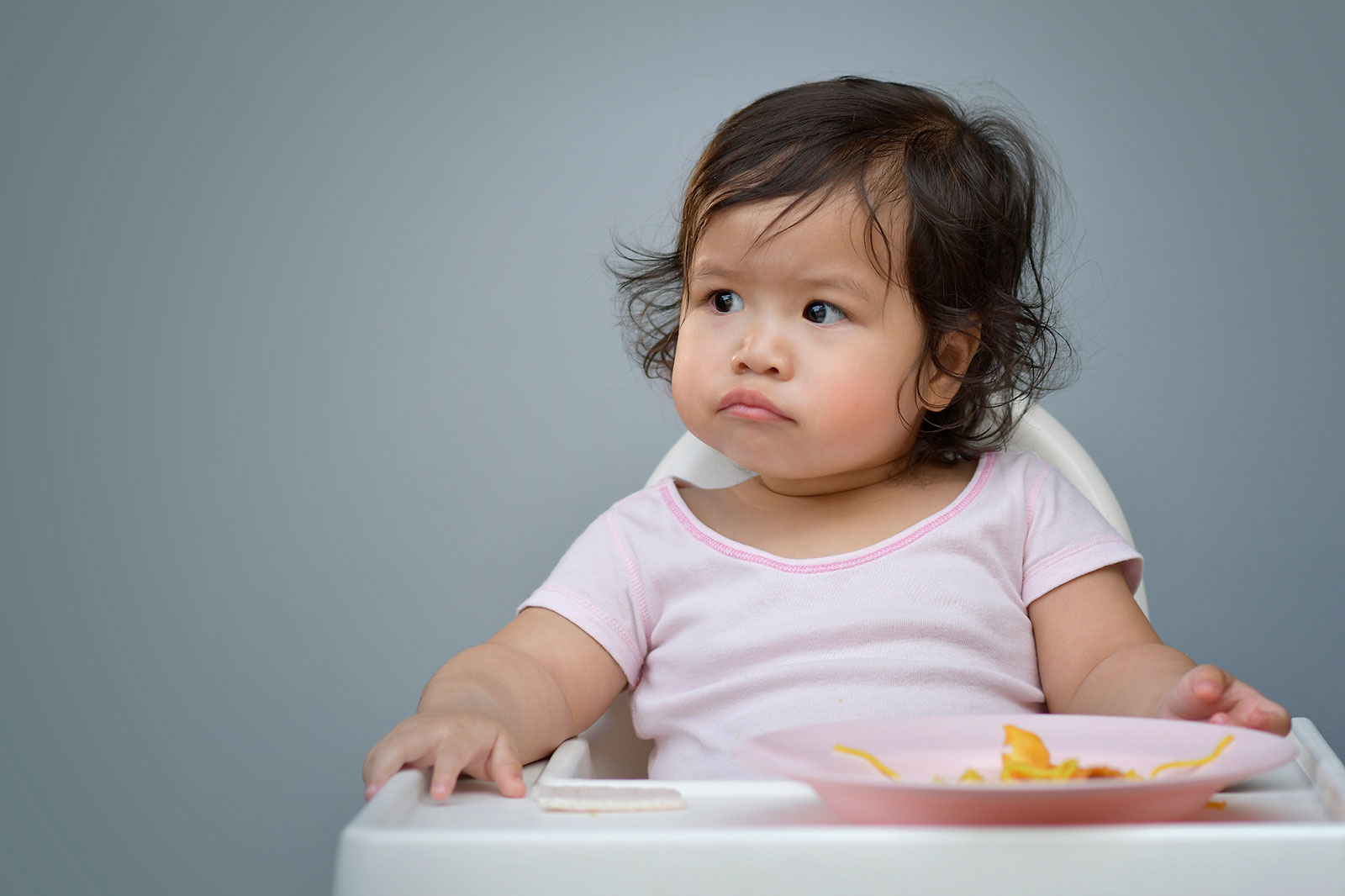[ad_1]
A fear of new foods is a natural stage of childhood that many kids go through between, on average, the ages of 2 and 7. Learn more about what neophobia is, how you can better help your child navigate this developmental phase, and how to know when it’s time to seek extra help.

What is Neophobia?
Neophobia is defined as a fear of new, or novel foods. For young children, this can mean they’re naturally skeptical of foods that they’ve never had before, foods that are prepared differently than they’re used to, or even foods that they just haven’t had in a while. This is all very normal–it probably comes from an evolutionary need to be wary of unfamiliar foods! And most kids will experience some level of neophobia between the ages of 2 and 7.
In my experience, it actually often sets in around 18 months and may coincide with a natural dip in appetite that happens as growth patterns slow. This can be alarming to parents, especially if their child used to eat everything as a baby, but the more we can keep this in perspective as a normal phase of development, the better we’ll be able to keep on trucking through it!
What You Can Do
If you have a toddler who seems to have a fear and aversion to new foods, and many do, there are a lot of things you can do to work with them on it. First of all, know that it is very normal and it is most definitely not your fault.
As Ellyn Satter, creator of the division of responsibility feeding method, says, kids today are not any more skeptical of new foods than they have been in the past and typically developing kids will work through it to get to a point where they’ll eat new things.
Things that can help may include:
- Letting them see you eat the food as you sit together at the table.
- Giving them lots of chances to experience, touch, and even taste the food before (and without) actually swallowing it. This could include cooking together, washing veggies, choosing foods at the grocery store, feeling a food to discover if it’s cold or hot.
- Reading books about food with positive experiences.
All of those positive types of food interactions can build up and help kids gain confidence, with the goal if eventually being ready to try new foods on their own time.
TIP: What you really don’t want to do is resort to only feeding your child the few foods they do like, because that usually only narrows the options that you have at any given meal. Aim to include 1-2 foods they usually like with any meal or snack and allow them to eat the foods in the amounts that they choose—without coercing or bribing or power struggles so mealtimes stay as pleasant as possible.
Most parents can help toddlers work through their skepticism of new foods by giving them the opportunity to slowly try and get used to a variety of new foods over time. (See the tips above.)
Skepticism of new foods is very normal, especially for young children, and may even stem from an evolutionary need to be wary of eating different things. Some research also shows that children may be genetically more likely to experience neophobia. Kids can also develop neophobia if they have had a scary or bad experience with food—such as an allergic reaction.
Many children will exhibit some degree of neophobia between the ages of 2 and 7. By the age of 8 or 9 kids should be getting the point where they are less skeptical of more foods, and more willing to easily try new things.
When to Reach Out for Help

Much of the time, fear of or reluctance to try new foods is totally normal. Other times, it can also be more serious—and require the help of your pediatrician and/or a feeding therapist. These are signs that you may need individualized assistance:
- If your child continues to have intense food fears past the age of eight or nine.
- If the fear is impacting them socially or nutritionally—if they’re losing weight or unable to eat at school, for example.
- If you are so stressed by the limited number of foods that your child eat that it’s keeping you up at night, making it impossible for to enjoy meals or actually find foods for your child.
- You feel in your gut that something isn’t right.
TIP: I recommend looking for a feeding therapist trained in “responsive feeding”. Two to consider are Thrive by Spectrum Pediatrics and Lutz Alexander Nutrition Therapy. The book Helping Your Child with Extreme Picky Eating may help too.
Top Tips for Managing Neophobia
- Know that this is a normal phase of childhood development.
- It may coincide with a decreased appetite (toddlers grow less rapidly than babies and often are less hungry), which can make it seem like a child is suddenly so picky. (When in fact, these are expected phases of development.)
- You can work on increasing positive food experiences even if that doesn’t mean your child actually eats the food.
- You can try these simple tips to help kids try new foods.
- Forcing bites, especially when the kids really are fearful of the food, can make things much worse.
- Aim to include 1-2 foods the kids usually like at meals and snacks to ensure there is always something they can eat.
- Review the feeding approach known as the Division of Responsibility.
- Remember that the goal here is longterm to raise a capable, confident eater—not to get them to eat broccoli tonight.
- Reach out for help whenever you have concerns.
[ad_2]
Source link


